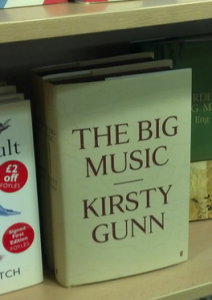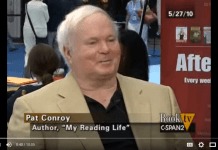Notable contemporary novelist and professor of writing practice Kirsty Gunn (pictured below) appears to be exercised with the length of some of the books currently winning garlands at the Edinburgh International Book Festival and elsewhere. She also seems concerned to link this enthusiasm for length with the uncertain economic climate, and the fundamentally “bourgeois” character of the novel.
Big books are dominating this year’s book festival,” begins her article in The Guardian:
“The economics behind the trend might have something to with it. Recessionary times prefer spectacle to introspection … And big books build confidence, too, a feeling a look-at-me can-do’ism … And now that time spent reading has to compete with films and on-line everything and facebook and twitter … surely that means that big must be more important than ever, to justify all that time they take us away from our PCs? To justify spending twenty quid or more? A big book must be better value, right? Money well spent?”
 Kirsty Gunn, incidentally, is the author of one quite long and very well-regarded novel entitled “The Big Music,” inspired by bagpipe music. (I know how she feels: The Clan Mackintosh’s banner pibroches for great pipes are truly inspiring.) It’s 496 pages in the latest paperback edition.
Kirsty Gunn, incidentally, is the author of one quite long and very well-regarded novel entitled “The Big Music,” inspired by bagpipe music. (I know how she feels: The Clan Mackintosh’s banner pibroches for great pipes are truly inspiring.) It’s 496 pages in the latest paperback edition.
But—and here’s the rub—”The novel, for all its history of ‘novelty’ as a genre, was created for a leisured bourgeois class with time and money on its hands to read. So in that way, it’s always been conservative at heart—a product of the economy that engendered it, and struggling always, as poetry never does, to break into the realm of dangerous, unpredictable (so potentially un-sellable) art.”
 Well was it now? Murasaki Shikibu’s “The Tale of Genji,” often called the world’s first novel and probably composed c.1005-8, was absolutely the product of a leisured class—of aristocrats. Not an honest mercantile capitalist in sight. I’m not sure just how precisely the rice-growing agrarian economy of Heian-era Japan equates to the circumstances of 19th-century industrialization that Kirsty Gunn appears to be alluding to, but it appears to have thrown up an almost identical literary form regardless. And yes, it’s very long.
Well was it now? Murasaki Shikibu’s “The Tale of Genji,” often called the world’s first novel and probably composed c.1005-8, was absolutely the product of a leisured class—of aristocrats. Not an honest mercantile capitalist in sight. I’m not sure just how precisely the rice-growing agrarian economy of Heian-era Japan equates to the circumstances of 19th-century industrialization that Kirsty Gunn appears to be alluding to, but it appears to have thrown up an almost identical literary form regardless. And yes, it’s very long.
And of course, aristocrats in societies elsewhere never had a moment’s time off from hunting and harrying peasants to actually have the leisure to read novels. That’s why we had to await the advent of industrial capitalism, with those endless empty hours away from the counting house or cotton mill director’s desk to fill with – long novels.
Admittedly, Kirsty Gunn is arguing less about politics than about the lack of artistic ambition in the bourgeois novel, which, God forbid, was economically compelled to please and entertain its readers. That might convince if it made more sense. What about the heyday of the 18th-century novel, with Samuel Richardson’s “Pamela,” Henry Fielding’s “Tom Jones,” right up to Horace Walpole’s “The Castle of Ortranto”? (Oops, Walpole, 4th Earl of Orford, not especially bourgeois there …) The bourgeois economics of the novel argument doesn’t sit well with the era of the Butcher Cumberland and the Elder Pitt. It also doesn’t do a whole lot to explain why Tennyson and Browing defined Victorian literature at least as much as Dickens.
Personally, I reckon the novel existed well before the advent of a leisured bourgeois class, and hasn’t been dictated by bourgeois attitudes. (Some novels might have been, but Kirsty Gunn says the novel per se.) I also reckon that modern writers can stretch out longer without fear of crushing the toiling masses in the process—I don’t believe that novel length equates to economic conditions in the simplistic way that, say, shoulder pads might be supposed to.
That said, Kirsty Gunn could be right about the influence of the economic trends of the times in one respect. Modern novels could be getting longer because publishing companies have cut back on editorial staff who could urge writers to cut, refine, and hone their creations, and achieve a tighter, sharper result. Now that sounds like a compelling economic argument to me.
































My sympathy is not engaged. Anyone who voluntarily reads prize-winning novels deserves everything they get.
But I approve of the modern trend towards big books. It makes it much easier to pick out the older, smaller, better ones on second-hand-shop bookshelves.
Is it just me, or have Jon Jermey’s comments lately turned into pretty much the best thing EVER?! By the way, where you been, Jon? I miss your Sunday posts. If you ever want to start writing for us again, we’d love to have you. But if not, I’ll gladly settle for more comments like your last few. A website’s comments section can never have enough sharp-witted types, I always say.
The Booker Prize went to Sense of an Ending a few years ago; it’s 163 pages and an excellent little novel. So it is not all about big books. But maybe short memories are involved.
Making a decision on a book’s inherent quality (or lack thereof) based on the number of pages makes about as much sense as basing the decision on price. Unless you view books as completely fungible…in which case, you’d be an idiot, and tasteless to boot.
And 1+ to Greg M.’s mention of Sense of an Ending.